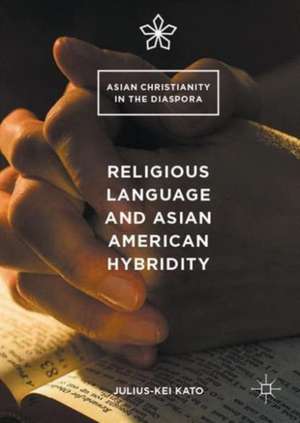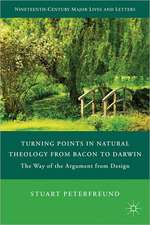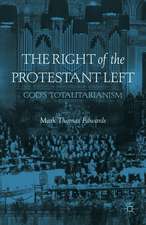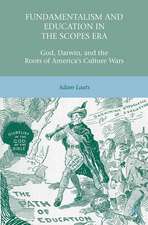Religious Language and Asian American Hybridity: Asian Christianity in the Diaspora
Autor Julius-Kei Katoen Limba Engleză Hardback – 11 aug 2016
| Toate formatele și edițiile | Preț | Express |
|---|---|---|
| Paperback (1) | 381.81 lei 6-8 săpt. | |
| Palgrave Macmillan US – 12 iun 2018 | 381.81 lei 6-8 săpt. | |
| Hardback (1) | 386.81 lei 6-8 săpt. | |
| Palgrave Macmillan US – 11 aug 2016 | 386.81 lei 6-8 săpt. |
Din seria Asian Christianity in the Diaspora
-
 Preț: 382.57 lei
Preț: 382.57 lei - 15%
 Preț: 694.87 lei
Preț: 694.87 lei - 15%
 Preț: 582.45 lei
Preț: 582.45 lei - 15%
 Preț: 581.98 lei
Preț: 581.98 lei - 18%
 Preț: 727.48 lei
Preț: 727.48 lei -
 Preț: 484.30 lei
Preț: 484.30 lei -
 Preț: 384.70 lei
Preț: 384.70 lei -
 Preț: 382.75 lei
Preț: 382.75 lei -
 Preț: 450.88 lei
Preț: 450.88 lei -
 Preț: 381.59 lei
Preț: 381.59 lei - 15%
 Preț: 633.19 lei
Preț: 633.19 lei - 15%
 Preț: 635.47 lei
Preț: 635.47 lei - 15%
 Preț: 690.29 lei
Preț: 690.29 lei - 15%
 Preț: 689.14 lei
Preț: 689.14 lei - 15%
 Preț: 635.80 lei
Preț: 635.80 lei -
 Preț: 450.88 lei
Preț: 450.88 lei -
 Preț: 451.87 lei
Preț: 451.87 lei -

Preț: 386.81 lei
Nou
Puncte Express: 580
Preț estimativ în valută:
74.01€ • 77.28$ • 61.12£
74.01€ • 77.28$ • 61.12£
Carte tipărită la comandă
Livrare economică 15-29 aprilie
Preluare comenzi: 021 569.72.76
Specificații
ISBN-13: 9781137582140
ISBN-10: 1137582146
Pagini: 195
Ilustrații: XIV, 206 p.
Dimensiuni: 148 x 210 x 18 mm
Greutate: 0.39 kg
Ediția:1st ed. 2016
Editura: Palgrave Macmillan US
Colecția Palgrave Macmillan
Seria Asian Christianity in the Diaspora
Locul publicării:New York, United States
ISBN-10: 1137582146
Pagini: 195
Ilustrații: XIV, 206 p.
Dimensiuni: 148 x 210 x 18 mm
Greutate: 0.39 kg
Ediția:1st ed. 2016
Editura: Palgrave Macmillan US
Colecția Palgrave Macmillan
Seria Asian Christianity in the Diaspora
Locul publicării:New York, United States
Cuprins
Introduction: What does Hybridity have to do with Religious Language? How Asian North American Hybridity Could Converse with Religion Today.- Part I: Foundations.- 1. Our Building Blocks: Hybridity, Diaspora, Hermeneutics and the Identity of the Interpreter.- 2. The What and What-Not of Asian North American Hermeneutics: What Mark 2:23-28 and l’affaire Peter Phan Illustrate.- 3. A Thick Description of Hybrid Theological Interpreters.- 4. Should There Really Be an “End of Faith”? Hybridity and Sam Harris’ Proposal for an “End” to Religion.- 5. Talking Back to Our Parents: What Asian North American Hybridity Can Suggest to Asia.- Part II: Hybridity Converses with Particular Themes.- 6.The New Testament Canon as Hybrid.- 7. The Changes in Jesus’ Plans: How Hybridity Reveals and Revels in a Developmental View of Jesus.- 8. John’s Claims of Superiority as Seen through Hybrid Eyes.- 9. Revelation’s Telos (Goal of History) as Seen through Hybrid Eyes.- 10. The Dark Side of Realized Hope: Hybridity Traces the Roots of Christian Intolerance.- 11. What is “Conversion” in a Hybridized Postmodern World? From Monoreligiosity to Interreligiosity.- Conclusion: Assessing Hybridity’s Role in Religious Language: Toward an Interreligious/Interspiritual Future.
Recenzii
“Religious Language and Asian American Hybridity is a welcome addition and a thoughtful contribution to the developing field of Asian American theology. Those seeking to understand the direction of this field today will benefit from reading this book.” (Andrew Ong, Reading Religion, readingreligion.org, April, 2017)
Notă biografică
Julius-Kei Kato, a proud Filipino-Japanese-Canadian hybrid, is Associate Professor of Biblical and Religious Studies at King’s University College, London, Canada. He has previously served as Assistant Professor at Sophia University, Tokyo, Japan, and Visiting Associate Professor at Kwansei Gakuin University, Nishinomiya, Japan. He is the author of How Immigrant Christians Living in Mixed Cultures Interpret Their Religion (2012). He has lived and studied in Manila, Tokyo, Rome, Jerusalem, and Berkeley-California, among other places.
Textul de pe ultima copertă
In this book, Julius-Kei Kato lets the theories and experiences of Asian American hybridity converse with and bear upon some aspects of Christian biblical and theological language. Hybridity has become a key feature of today’s globalized world and is, of course, a key concept in postcolonial thought. However, despite its crucial importance, hybridity is rarely used as a paradigm through which to analyze and evaluate the influential concepts and teachings that make up religious language. This book fills a lacuna by discussing what the concept of hybridity challenges and resists, what over-simplifications it has the power to complicate, and what forgotten or overlooked strands in religious tradition it endeavors to recover and reemphasize. Shifting seamlessly between biblical, theological, and modern, real-world case studies, Kato shows how hybridity permeates and can illuminate religious phenomena as lived and believed. The ultimate goal of the move toward an embrace of hybridity isa further dissolution of the thick wall separating ideas of "us" and "them." In this book, Kato suggests the possibility of a world in which what one typically considers the "other" is increasingly recognized within oneself.
Caracteristici
Shines a light on the interdisciplinary nature of postcolonial, cultural, Asian North American, biblical, and theological studies Offers a very useful contribution to the emerging, rapidly developing realm of hybridity studies Provides ample anecdotes and analogies that make the discussions easy to follow and absorb











